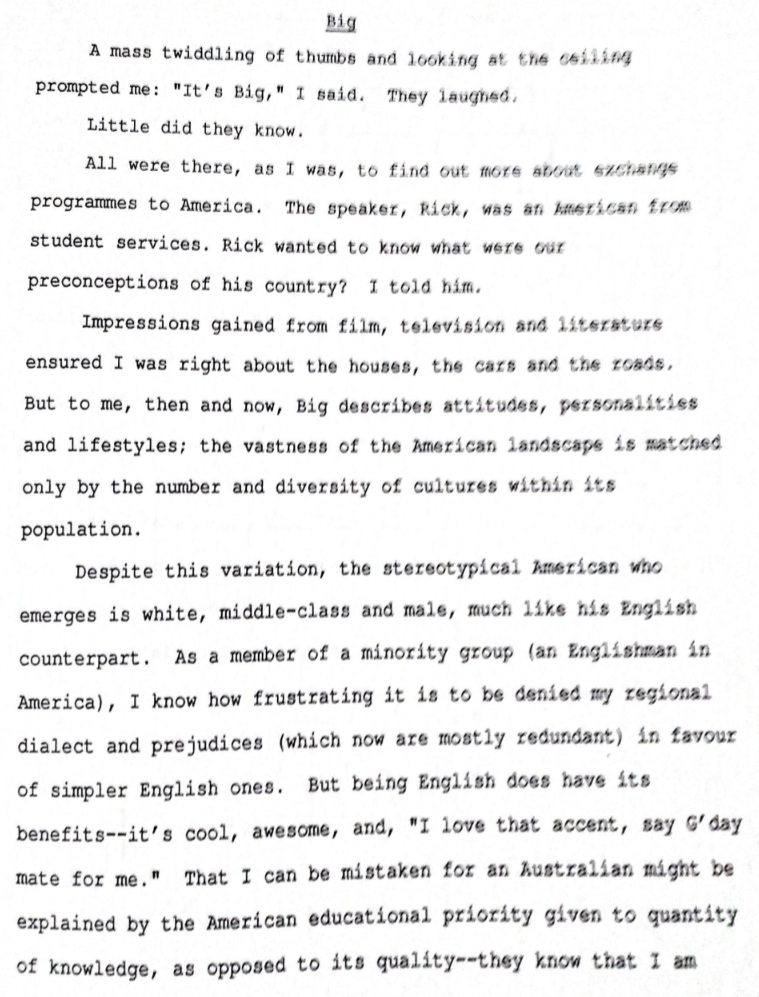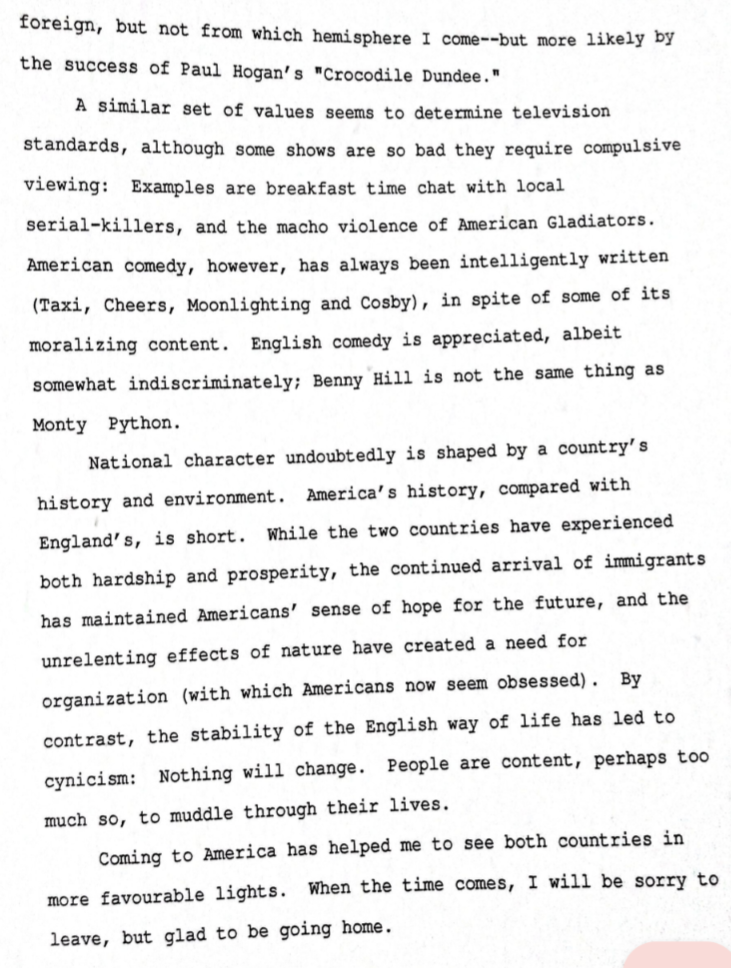BANGERS 'N' MASH
I guess one reason I’m able to maintain my weight is all the healthy eating I’ve been doing lately. So I thought I’d share with the one or two people who come here some of my culinary creations. Who knows where it will lead?
For Valentine’s Day I came up with the original and undoubtedly passionate meal idea of… sausages. Really it’s a sausage casserole (I looked at the back of a packet of Colman’s casserole mix in Tesco for the ingredients and just left out the cancer-causing stuff - not that I’m feeling superior in any way as I’m sure I’ve eaten plenty of it in the past), but I like to call it:
Bangers ‘n’ Mash:
- olive oil
- chilli oil
- garlic paste
- herbs and spices: dried sage, parsley, oregano, - paprika, black pepper, sea salt
- baby onions
- green pepper
- mushrooms
- tinned, chopped plum tomatoes
- instant onion gravy
- tomato ketchup
- cooked Lincolnshire sausages
- potatoes
- butter
- milk
This is a nice way to use up some leftover sausages - you don’t have to use Lincolnshire sausages, any will do, same with most of the ingredients. I just use what’s available to me. This will make enough for four servings.
Get a large pan for your peeled and, washed and finely chopped potatoes, adding a drop of olive oil and some sea salt and covering with water. Put it on a high heat until it comes to the boil, then simmer for fifteen to twenty minutes or until the potatoes are soft enough to mash easily.
Assuming you have some pre-cooked sausages and you’ve prepared all the veg, heat up your wok or large frying pan, add a good shake of olive oil, chilli oil to suit your taste and a little butter to stop the oil from burning. When it’s hot, add a teaspoon of garlic paste, a shake of the herbs and spices followed quickly by the onions, peppers and mushrooms and stir-fry on a high heat for a few minutes.
The longer you do it, the softer and smaller the peppers and mushrooms will be, so do it as you like it. Add the tomatoes, make up half a pint of instant onion gravy and stir it in. Add a teaspoon of ketchup (or use lemon juice, vinegar and sugar) and the pre-cooked sausages.
Leave to simmer for at least twenty minutes. When the potatoes are ready, drain and mash with a dollop of butter and a little milk.
Serve.
Like most foods, it will taste even better the following night re-heated.
THE COLORADO TRAIL
I am rapt. Tight and warm in my sleeping bag, I stare out at the night sky. It is perfectly clear. My fellow hikers are nearby, and in the distance we can hear the sound of coyotes. They are neither barking nor howling, but something between the two, as if they are calling to one another. Their calls become louder.
In the corner of my eye I can see our food, in white plastic bags, hanging from a tree. The coyotes are running, beating a path towards us. My heart races and pounds, with excitement and apprehension, and the effects of ascending so quickly to nine thousand feet. My head aches and I feel sick. Tomorrow, we go higher.
The conifers which shelter us are twenty feet tall. Their tops dance in the wind against a backdrop of stars on a moonlit stage. There goes a shooting star! It is too much. My head spins.
Sleep is not easy. There is a low rumbling, like distant thunder. Then, as if the whole mountain is collapsing, a gust of wind sweeps through the trees, passing us by. It sounds like a train. The gusts become stronger and more frequent; and we are lying on the tracks of the main line. This is a ghost train! The trees bend while I lie rigid, waiting for the crash.
I rise with the sun.
The hike up, the next day, is long and arduous in driving winds. “Wail winds wail/ All along, along, along/ The Colorado Trail” (“The Colorado Trail” lines 5-8). The wisps of cloud in the morning sky have become huge and dark. Powdery snow swirls around us, then bites into our faces, as we struggle with freezing hands to set up the tents. The slightest effort saps all our strength and leaves us gasping for air. This, in turn, increases our loss of water with sweat and exhalation.
Once inside, we attempt to melt snow for drinking and cooking food: It takes about two hours to produce one litre. (We had estimated that each person–four in all–needed four litres per day. Even with two stoves, it would be impossible.)
I have no appetite, but manage to eat something. My legs and feet are cold.
We try to get some sleep. Although it is warm in our bags, the fierce wind outside makes it impossible. My throat, mouth and lips are dry while the insides of the tent are wet with condensation; as this freezes, it is spat back into our faces by the slapping canvas which seems about to be hoisted away from us at any moment.
The night is endless. I am waiting for a train to take me out of here, but I know they will not stop to pick up passengers. They are expresses, and their speed is urgent. They are delivering the news: And the news is History. We will not climb the peak. We will go down.
Works Cited
Anonymous. “The Colorado Trail.” In S. Barnet, M. Burman, & W. Berto (Eds), An Introduction to Literature (9th ed.). Boston: Scott, Foresman & Company. (1989). p.411.
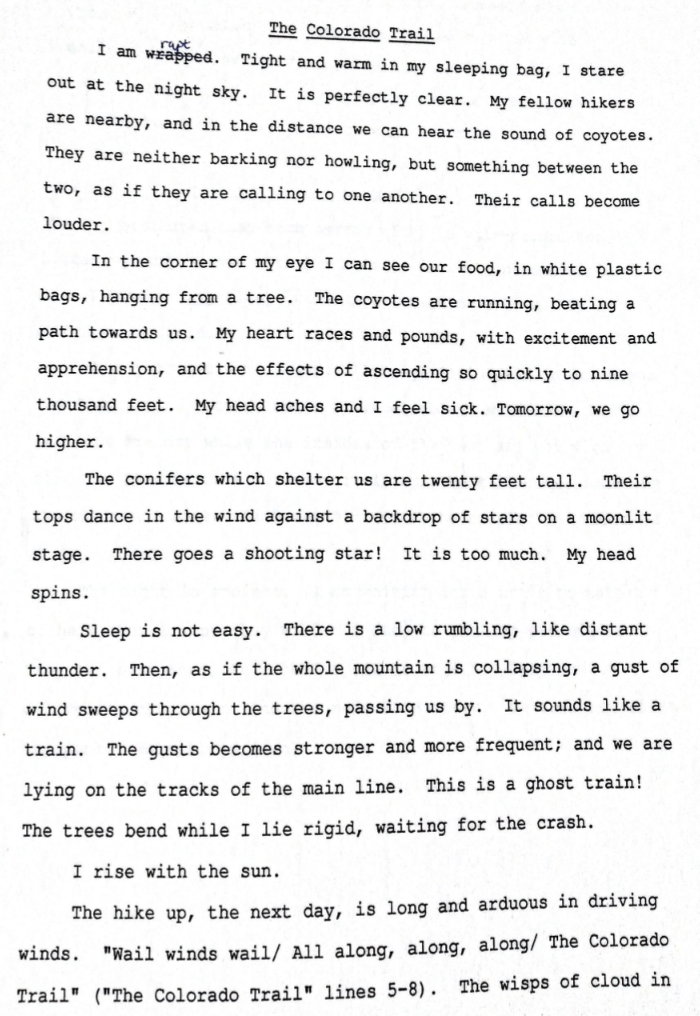
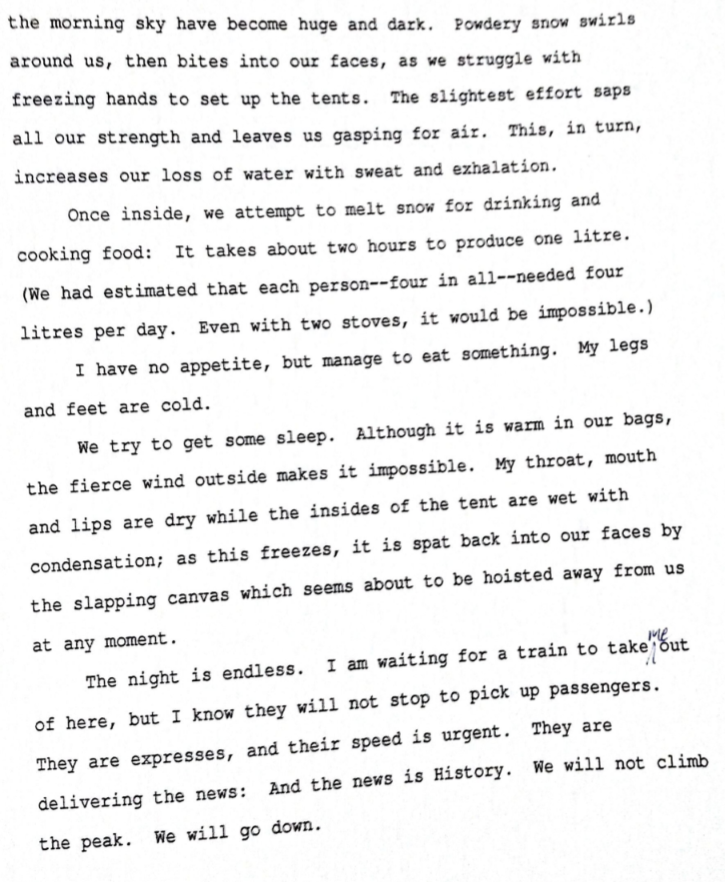
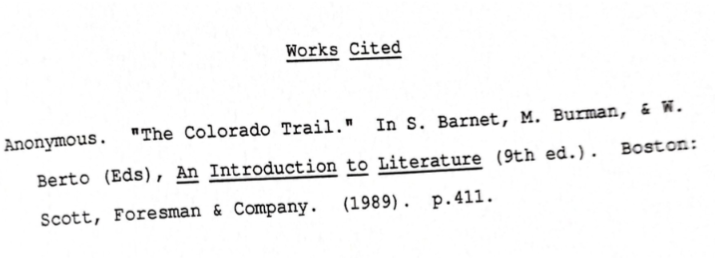
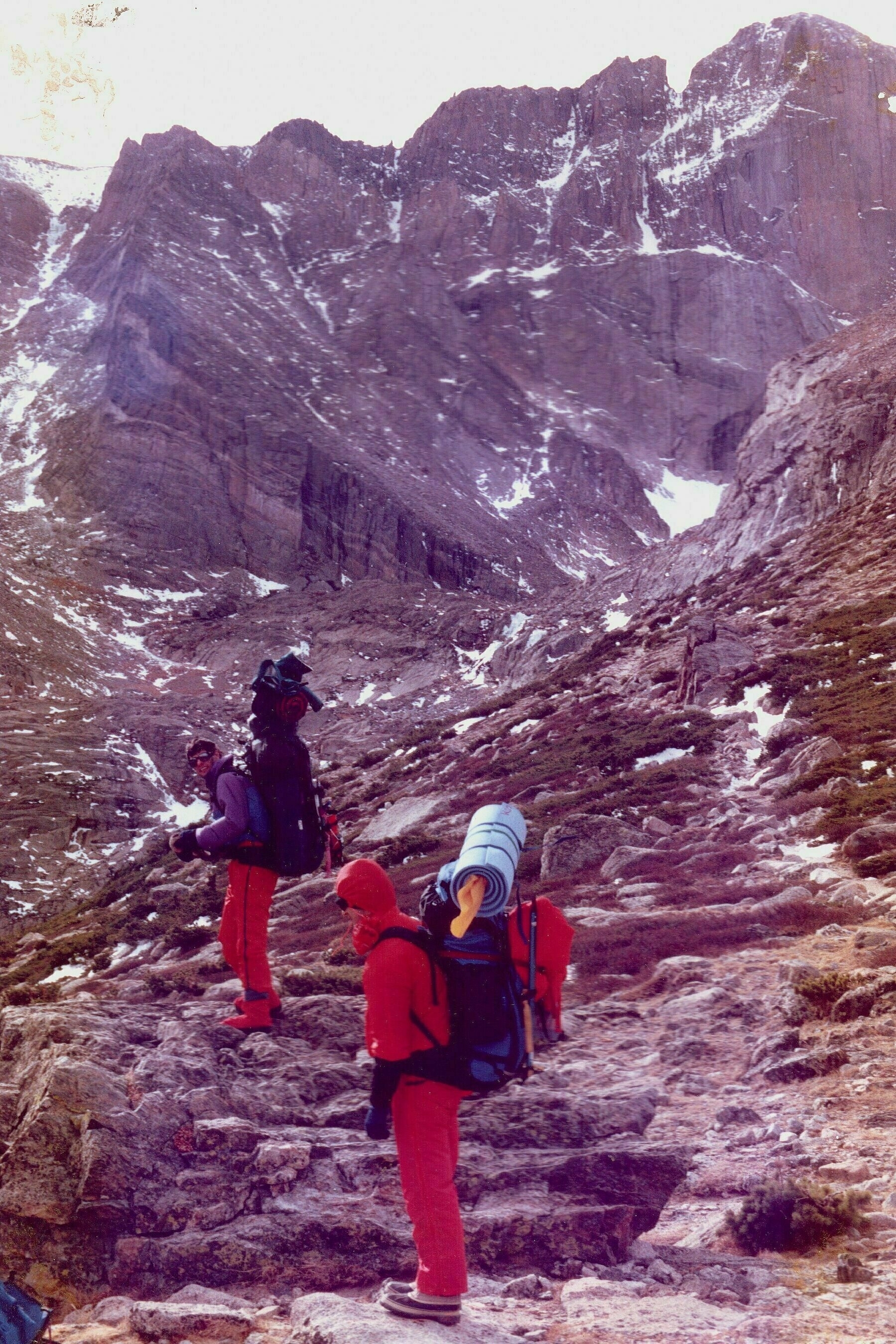
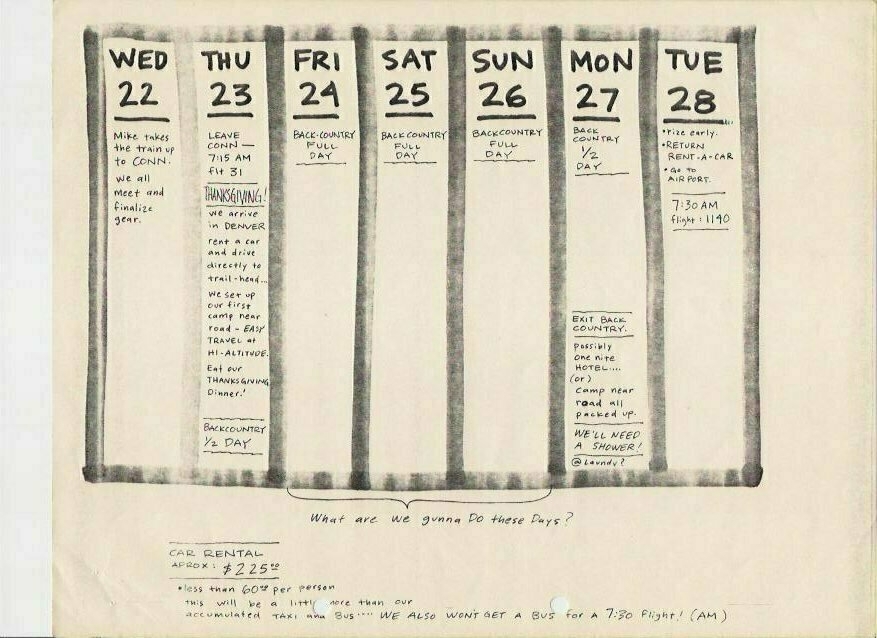
MULTI-CULTURAL SOCIETIES
Mark Twain once informed a preacher visiting Hartford that every word of a sermon the latter had just delivered was in a book at Twain’s home. Concerned about the apparent plagiarism, the preacher was only too grateful to receive the book in a parcel at his hotel. It was a dictionary (Wister ziii).
As one of Twain’s characters, Huckleberry Finn, said of his creator, he told the truth, mainly (Twain 441). Twain’s practical joke could be thought of as a compliment. The preacher expressed his thoughts in a symbolic code which Twain and others could comprehend; by sharing a common language they were able to share ideas.
Although words are defined objectively, often their use is subjective. People learn language not from dictionary definitions, but from their experience of situations in which it is used. Generally, the words first learnt by a child are nouns describing concrete objects (the meaning of the word is obvious). The understanding of abstractions is more difficult, and, perhaps because of this, its value is emphasized in Western culture. In other societies, it may be of greater importance correctly to describe a feature of the environment. Similarly, a person-oriented approach may be more civilized than one that is materialistic.
Just as cultural values differ, so do languages. But, whereas languages can be translated into other tongues, values remain unaltered. It could be argued, therefore, that true translation is impossible; at best, authenticity is compromised. Ideally, it seems, a language is needed which is common to all.
The modern reality, of different ethnic groups within one society (but speaking different languages and living separate lives), is a problem not only of intolerance, but also of ignorance. It is not enough simply to be aware of differences. They must be understood in terms of the beliefs they represent. This can be achieved only through experience, preferably personal, of that way of life, and its language from which it is inseparable.
That it is the speakers of minority languages who must learn the language of the majority is a matter of practicality. That they should suffer educationally or socially in relation to their peers is due to cultural biases against them, the effects of which often are compounded by financial poverty. But if such minorities were to decide to opt out they would surely become the objects of greater hostility than that which they already face; the difference from the norm which they represent is proportional to the fear and hatred they induce in others. Alternatively, intregration with the mainstream would further dilute their tradition.
It is possible, and it is certainly necessary, to live in a multi-cultural society. But as the differences become greater so do the problems that come with them. In choosing between separation and homogeneity of cultures, people usually do not have the advantage that Huck Finn has: Faced with the prospect of adoption and “sivilization” by Aunt Sally, Huck knows that he must move on, he can’t stand it. But then, he’s been there before (Twain 650).
Works Cited
Twain, M. “The Adventures of Huckleberry Finn.” In The Family Mark Twain. (1988). New York: Dorset Press. pp. 441-650.
Wister, O. “In Homage to Mark Twain.” In The Family Mark Twain. (1988). New York: Dorset Press. pp. xiii-xxiv.
Works Consulted Bloom, A. D. (1987). The Closing of the American Mind. New York: Simon and Schuster.
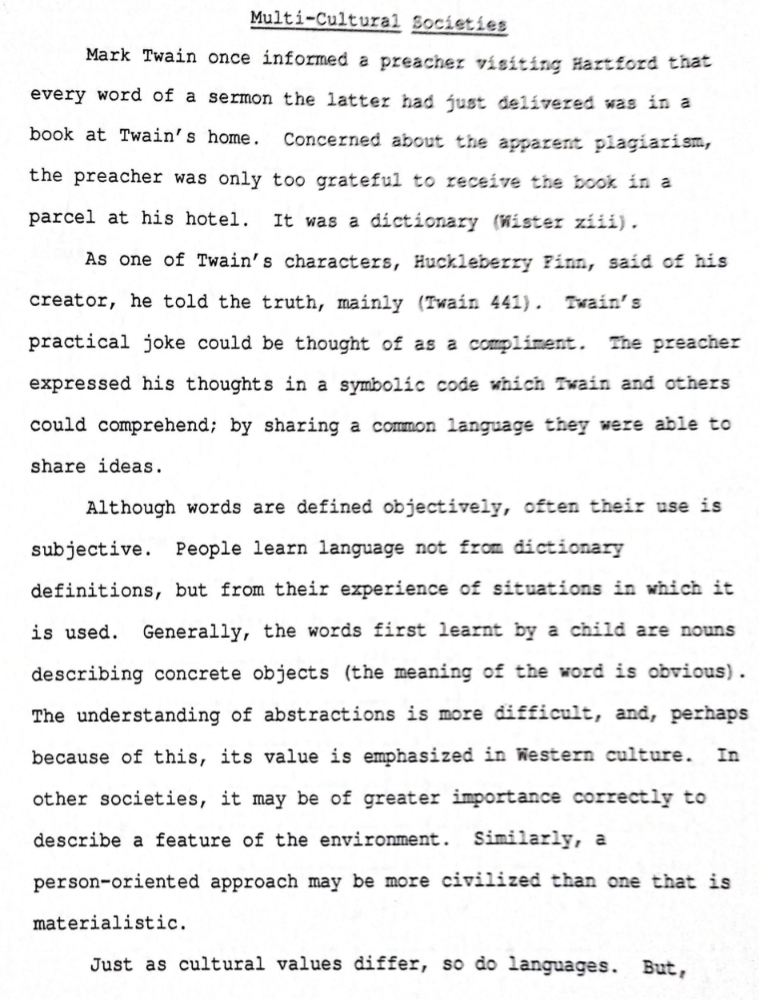
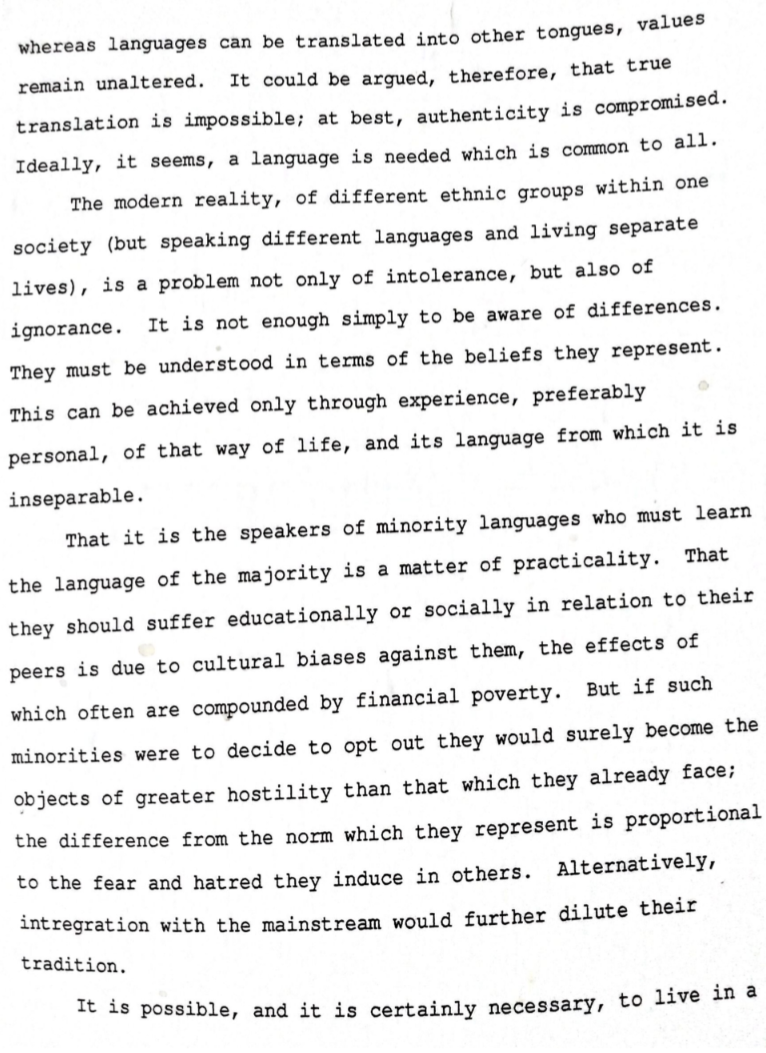
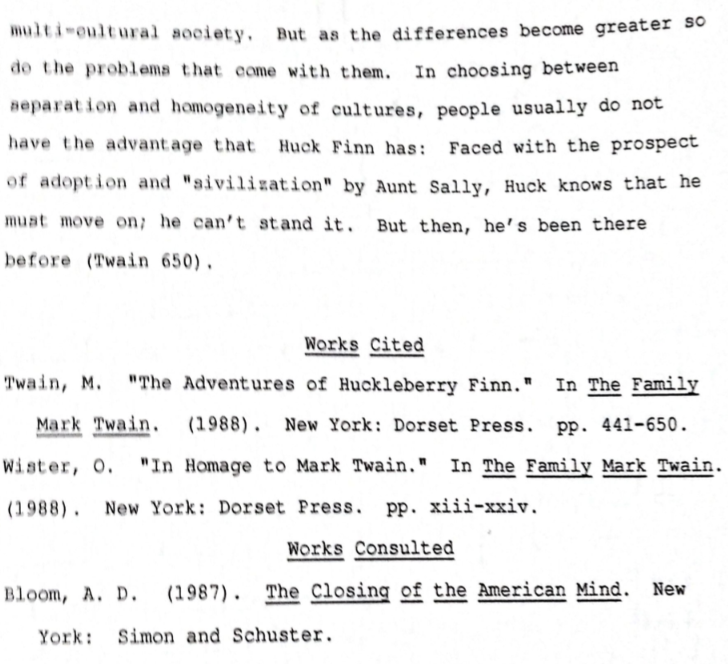
BIG (IN AMERICA)
A mass twiddling of thumbs and looking at the ceiling prompted me: “It’s Big,” I said. They laughed.
Little did they know.
All were there, as I was, to find out more about exchange programmes to America. The speaker, Rick, was an American from student services. Rick wanted to know what were our preconceptions of his country? I told him.
Impressions gained from film, television and literature ensured I was right about the houses, the cars and the roads. But to me, then and now, Big describes attitudes, personalities and lifestyles; the vastness of the American landscape is matched only by the number and diversity of cultures within its population.
Despite this variation, the stereotypical American who emerges is white, middle-class and male, much like his English counterpart. As a member of a minority group (an Englishman in America), I know how frustrating it is to be denied my regional dialect and prejudices (which now are mostly redundant) in favour of simpler English ones. But being English does have its benefits–it’s cool, awesome, and, “I love that accent, say G’day mate for me.” That I can be mistaken for an Australian might be explained by the American educational priority given to quantity of knowledge, as opposed to its quality–they know that I am foreign, but not from which hemisphere I come–but more likely by the success of Paul Hogan’s “Crocodile Dundee.”
A similar set of values seems to determine television standards, although some shows are so bad they require compulsive viewing: Examples are breakfast time chat with local serial-killers, and the macho violence of American Gladiators. American comedy, however, has always been intelligently written (Taxi, Cheers, Moonlighting and Cosby), in spite of some of its moralizing content. English comedy is appreciated, albeit somewhat indiscriminately; Benny Hill is not the same thing as Monty Python.
National character undoubtedly is shaped by a country’s history and environment. America’s history, compared with England’s, is short. While the two countries have experienced both hardship and prosperity, the continued arrival of immigrants has maintained Americans' sense of hope for the future, and the unrelenting effects of nature have created a need for organization (with which Americans now seem obsessed). By contrast, the stability of the English way of life has led to cynicism: Nothing will change. People are content, perhaps too much so, to muddle through their lives.
Coming to America has helped me to see both countries in more favourable lights. When the time comes, I will be sorry to leave, but glad to be going home.
